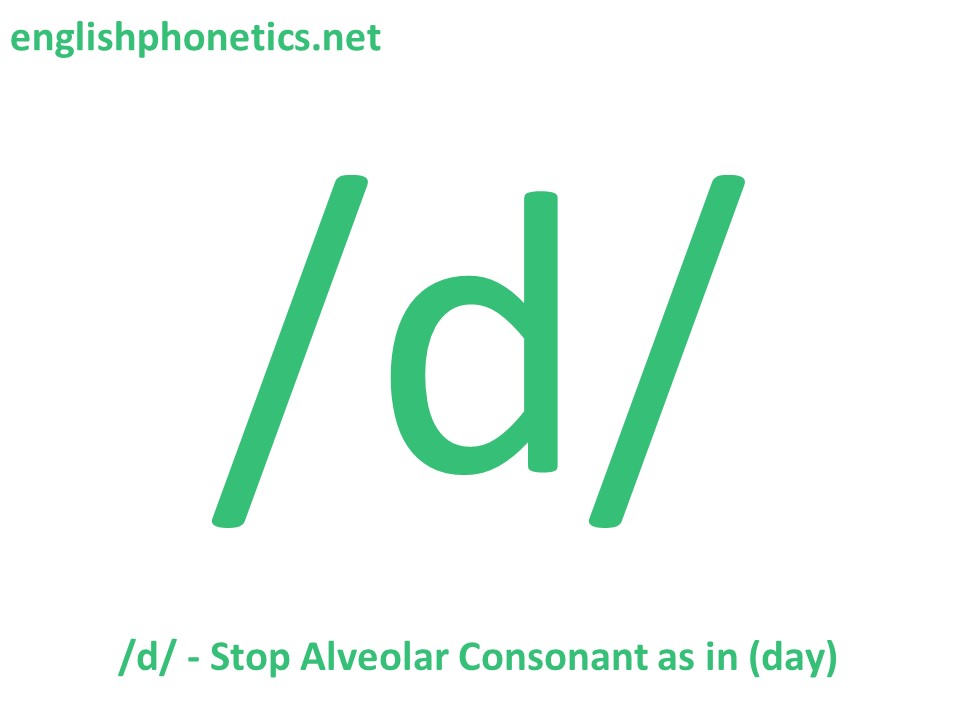Spelling:
- "d" - had, avoid
- "de" - made, reside
- "dd" - sudden, address
- "ed" - loved, feared
LISTEN
The sound /d/ can be in these consonant clusters:
-
Beginning of a Syllable
-
End of a Syllable
| d_final_clusters.mp3 |
/rd/ ("rd" / "red") - hard,
feared
/ld/ ("ld" / "led" / "lled') - told, piled, filled
/nd/ ("nd" / "ned" "nned") - land, rained, planned
/md/ ("med" / "mmed" / "mbed") - claimed, hummed, combed
/lmd/ ("lmed") - calmed
/rmd/ ("med") - harmed
/bd/ ("bed" / "bbed") - cubed, robbed
/ld/ ("ld" / "led" / "lled') - told, piled, filled
/nd/ ("nd" / "ned" "nned") - land, rained, planned
/md/ ("med" / "mmed" / "mbed") - claimed, hummed, combed
/lmd/ ("lmed") - calmed
/rmd/ ("med") - harmed
/bd/ ("bed" / "bbed") - cubed, robbed
/gd/ ("gged") -
hugged
/vd/ ("ved") - loved
/zd/ ("zed" / "sed") - amazed, raised
/ðd/ ('thed") - breathed
/dʒd/ ("ged" / "dged") - raged, judged
/dz/ ("ds" / "des") - roads, grades
/rdz/ ("rds") - cords
/ldz/ ("lds") - builds
/ndz/ ("nds") - friends
/vd/ ("ved") - loved
/zd/ ("zed" / "sed") - amazed, raised
/ðd/ ('thed") - breathed
/dʒd/ ("ged" / "dged") - raged, judged
/dz/ ("ds" / "des") - roads, grades
/rdz/ ("rds") - cords
/ldz/ ("lds") - builds
/ndz/ ("nds") - friends
Grammar Tip:
The “-ed” ending is used to mark most past tense verbs, some past participles, and some participial adjectives. The “-ed” ending is pronounced /d/ after a vowel or a voiced consonant.
The "-ed" ending is pronounced /əd/ after the sounds /t/ or /d/.
COMPARE
Compare /d/ with /t/:
| compare_d-t_1.mp3 |
/d/.../t/.../d/.../t/.../d/.../t/...
These are both alveolar, stop consonants. However, /d/ is a voiced consonant and /t/ is a voiceless consonant. When you pronounce /t/, your vocal cords should vibrate.
These are both alveolar, stop consonants. However, /d/ is a voiced consonant and /t/ is a voiceless consonant. When you pronounce /t/, your vocal cords should vibrate.
You can hear the difference between /d/ and /t/ in these words.
| compare_d-t_words.mp3 |
1. A. dip, B. tip
2. A. drunk, B. trunk
3. A. pad, B. pat
4. A. mend, B. meant
5. A. burned, B. burnt
6. A. rending, B. renting
2. A. drunk, B. trunk
3. A. pad, B. pat
4. A. mend, B. meant
5. A. burned, B. burnt
6. A. rending, B. renting
PRACTICE
Listen and repeat these words:
| words_with_-d-.mp3 |
|
1. dot
2. dear 3. drink 4. draw 5. dresser 6. sad 7. tend 8. birds 9. learned 10. loved |
11. judged
12. understand 13. divided 14. address 15. redo 16. thunder 17. medicine 18. bundle 19. mandatory 20. dedicated |
Now, practice /d/ in sentences. Say the words first, then the sentences.
| sentences_with_-d-.mp3 |
1. doctors - diagnose - kinds
- diseases
Doctors diagnose all kinds of diseases.
2. did - decide - dessert
Did you decide what you want for dessert?
3. children - dressing - different
Children love dressing up as different characters.
4. send - include - address
When you send the invitations, include your address.
5. burned - dish - dinner
I burned the dish I was cooking for dinner.
6. heard - bad - Monday
I heard the bad news on Monday.
Doctors diagnose all kinds of diseases.
2. did - decide - dessert
Did you decide what you want for dessert?
3. children - dressing - different
Children love dressing up as different characters.
4. send - include - address
When you send the invitations, include your address.
5. burned - dish - dinner
I burned the dish I was cooking for dinner.
6. heard - bad - Monday
I heard the bad news on Monday.
To practice with different varieties of English, choose another native English speaker by clicking one of the links below:


